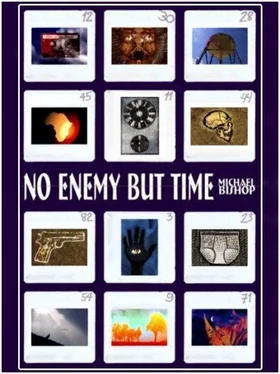“Are you a commando or something, Johnny?”
“Or something, I guess. It’s a kind of grandiose depth-psychology therapy for my lifelong affliction.”
“The one you’re learning to control?”
“Right. At government expense. You won’t see my eyeballs roll up into my head this trip, Sis.”
“Unless I shoot you.” She sat down at the table with a cup of coffee. “That’s why you’re going to Zarakal, isn’t it? A correlation between that country and the landscapes of your dreams.”
“My lips are sealed.”
* * *
Conscientiously concealing his presence from his grandmother, Joshua stayed through Christmas. Peggy Rivenbark lay abed like a superannuated angel, decaying into the expensive linen mulch of paradise and dreaming for the unborn great-grandchild in Anna’s womb a future of crash-proof spaceliners and pristine colony planets. Well, maybe not. She was an old woman who had been born five years after Kitty Hawk, and it was more likely that she hallucinated not the future but the past. Meanwhile, she henpecked heaven with her prayers.
What was it that Woody Kaprow had said? The future is forever inaccessible…. It has no pursuable resonances. Joshua was not sure he believed that. The past, after all, was the friable medium in which the future germinated. And the present was an illusion, another aspect of the great material lie known among Hindus as maya ….
So much for metaphysics.
For fear that the sight of him would kill her, Joshua purposely did not reveal himself to Peggy Rivenbark.
Anna and he spent most of the holidays talking. When it came time for him to leave, they had exhausted hundreds of topics without depleting their stores of mutual affection. The nametag on his uniform jacket might say Kampa , but he was also a Monegal, and maybe when he got back from his tour of duty in the Horn, they would finally be reunited as a family. Anna and he affirmed this hope aloud over and over again, but on the transport aircraft flying back to Eglin, Joshua had his doubts. His past was a dream, and the future was inaccessible.
Life in Shangri-la
Inmany ways, the period after the unexpected rainfall—the five or six months after I discovered Helen’s pregnancy—comprised an Edenic idyll of the kind Jacqueline Tru’s father had conjured from the dream stories I told him in the Mekong Restaurant. Our little village became Shangri-la.
Suddenly we had plenty to eat. No one had to bust a gut either foraging or hunting. Occasional hominid killers like leopards and hyenas ignored us to concentrate on the gazelles, zebras, and antelope that had filtered back into our area from the vast grasslands south of Mount Tharaka. I was dreaming this idyll.
Submerged in my experience without benefit of continuous rational consciousness, I may have been more alive, alert, and accepting than at any other time in either of my pasts. Bearded and sinewy, I glided among the Minids like a dispossessed spirit from their own uncertain future.
Helen glowed. Her face shone the way licorice shines, her belly the way a jawbreaker sucked down to streaky indigo glistens against the palate. Her several bouts of nausea before and after Mary’s death had of course signaled the habiline equivalent of morning sickness. Her metabolism had finally adjusted to the changes wrought by conception, though, and now she was a candidate for the “after” photograph in a health spa ad, sleek and vivacious in spite of that abdominal bulge. Half my mind began to wonder when she would bear our child, the other half to formulate lullabies of haunting prehistoric sweetness.
We were people of leisure.
During this same period I began to rise before dawn to lift my own wordless aubades to savannah and sky. These songs came out of me from sources unidentifiable then and altogether untappable now.
Although during my adolescence and young manhood I had written poetry prompted by some of my spirit-traveling episodes, my new songs were almost entirely spontaneous. I awoke them from preconsciousness and released them to the light as crude melodies.
Other habilines—not only Minids, but Huns in their high fastnesses southwest of us—answered my songs. The melancholy baying of wolves and the uncanny arias of humpback whales resonated alike in our voices, and the timbre of our singing seemed to impart outline and solidity to that quasi-prehistoric landscape. To put it another way, our morning songs made my dream world real.
My total absorption into both the Minid band and their curious simulacrum of the Pleistocene altered even the texture of my subconscious mind. I ceased to dream about my twentieth-century past and began to experience night visions full of ancient East African imagery. By becoming a habiline and accepting the reality of their world I had purified my dreams. Seville, Van Luna, Cheyenne, Fort Walton Beach, Riverdale, and all the other hot spots of my childhood no longer figured prominently in these visions.
Now I was far more likely to dream about the fauna around Lake Kiboko, the wildflowers along the rivercourses, or my relationship with Helen.
This change embodied a kind of paradox. Whereas during my life in the twentieth century such dreams would have been spirit-traveling episodes, now they were merely dreams. My physical displacement into the past had cured me of the principal affliction of my life. At last I was “normal.” My dreams proved as much. And I hoped that I would never again have to suffer the disorienting indignity of spirit-traveling….
* * *
One day was like another. Each began with sunrise and limped through the heat of noon toward the exit signs of twilight. Between these clear-cut demarcations we took care to consume at least the recommended minimum daily requirements of nutrients sufficient for survival. The savannah was our supermarket, Mount Tharaka our after-hours convenience store. When not playing habiline games or furiously loafing, we shopped. Our purchases were paid for in the coin of cunning, persistence, luck, or various combinations of all three. If we ever encountered inferior merchandise or empty shelves, there was no manager to complain to and no way of getting our money back. Stumbling across an extraordinary bargain was one of the few unfailing means of burning a noteworthy brand into the otherwise bald backside of the day.
About two-thirds of the way through Helen’s pregnancy, when her belly was ripening like a huge Concord grape, she and I tripped over an extraordinary bargain. The jolt of this discovery bumped me out of dream consciousness into the predicament of rational awareness. Because what we had found was too big for us to dismantle alone, I left Helen on the edge of a small rivercourse and returned to Shangri-la for Alfie and the others. By eye movements and clumsy vocalizations I made them understand my welcome news and led them down the mountain to the stream bed on the steppe.
Helen was sitting on the bank of the little gully jabbering insults at the carrion birds swooping on our find.
It lay capsized in the water, trapped by the submerged stones into which it had apparently lumbered while alive. The vultures could get at it only by alighting on its shiny flank or wading determinedly through the muddy stream, their outspread pinion feathers dripping and their neck ruffs comically frazzled. When Alfie, the rest of the Minids, and I burst onto the scene, the vultures scattered, but settled near enough at hand to glut themselves with envy if not with flesh.
Helen and I had found a hippopotamus, a representative of H. gorgops , that rare species with bulging, periscopic eyes. Moreover, we had found it quite soon after its death, in a section of rivercourse partly concealed from the eyes of carrion eaters by the surrounding shrubbery. Sheer serendipity. Had we been a day earlier, we might have supposed the hippo contentedly wallowing and so passed it by. On the other hand, had we been a day later, the vultures would have reduced our supermarket special to an immense naked rib cage. Ecologically speaking, we had come in the niche of time, and the hippo was ours, all ours.
Читать дальше



![Ally Carter - [Gallagher Girls 01] I'd Tell You I Love You But Then I'd Have to Kill You](/books/262179/ally-carter-gallagher-girls-01-i-d-tell-you-i-lo-thumb.webp)








